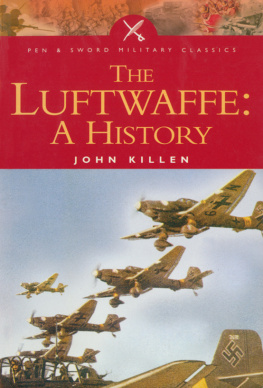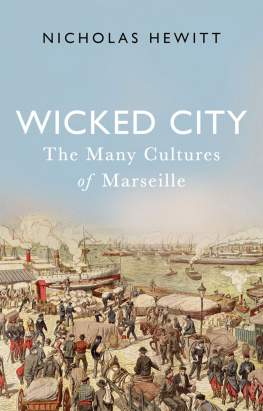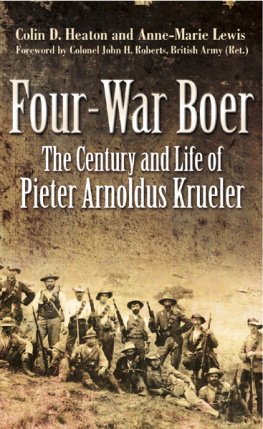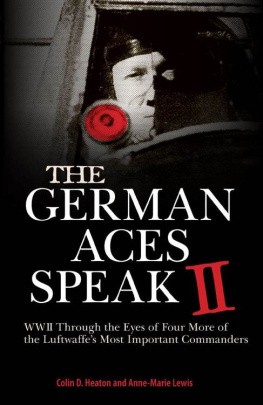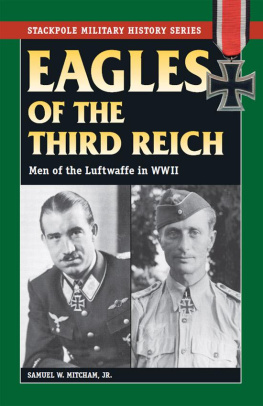Foreword
O VER THE YEARS IT has been my privilege and pleasure to meet many World War II fighter pilots from both Allied and Axis countries. Their number includes Sir Douglas Bader, Adolf Galland, Gnther Rall, Walter Krupinski, Gabby Gabreski, Johnny Johnson, Saburo Sakai, Chuck Yeager, and many more. I can say unequivocally that none of these fine airmen, as deserving as they were, had the great good fortune to have biographies written of them that compare in quality, accuracy or tone to Colin Heatons superb book on Hans-Joachim Marseille.
This stems in equal parts from Heatons research and Marseilles mystique. His astounding victory record, phenomenal shooting accuracy and less than Prussian demeanor were written about for years, most often in a questioning way. It just did not seem possible that someone so young, with such engaging characteristics, could also be an ace of such legendary skills.
As the author reveals, Marseille did in fact differ from almost every other fighter ace, particularly those of the Luftwaffe, in many significant ways. He rose above the traditional German officers strict military regimen, just as he rose above the super-nationalistic and racist precepts of the Nazi regime. Only a man of Marseilles ability could have done this and escaped the usual political repercussions.
Marseilles blazing combat career was made possible by his unbelievable skill. Heaton has captured this. Perhaps even more important, he has also captured the many incidents in which Marseille revealed his humane nature. He was a young man who cared both for his comrades and, when the fight was over, for his enemy.
Col. Walter J. Boyne
T HE ENIGMA THAT IS Hans-Joachim Marseille is not easily deciphered and seldom discussed. This Knight of the Reich personified all that was taboo to the Fatherland. In many ways, he was a typical Berliner youthrebellious, Bohemian, and juvenile. Yet, he also possessed the tenacity and discipline necessary to achieve aeronautical excellence. This dichotomy clearly frustrated the German High Command and made him the idol of the rank and file. This quintessential bad boy, however, was a chivalrous and brave warrior. He amassed 158 kills and was dead by twenty-two years of age.
Certainly, this inherent contradiction can be attributed to his upbringing, surroundings, and Huguenot heritage. Each, I believe, contributed to his essence as well as his success. It provided a duality not often found in a German military man.
The Huguenots, a term originally used in derision, were traditionally known for their harsh and pointed criticisms of the doctrine and worship traits of the Catholic Church. Living in France, they denounced the Pope as a tyrant. These controversial views provoked persecution culminating in the St. Bartholomews Day massacre (August 24October 3, 1572), wherein approximately thirty-thousand Huguenots were killed, forcing mass exodus from France or conversion to Catholicism.
Many Huguenot refugees found safe haven in Germany, and a good number settled in Berlin. By 1700, one-fifth of the citys population was French speaking. The use of French in their Church services lasted until the early 1800s.
Clearly, this heritage promoted individuality as well as a conscious appreciation of those who suffer persecution. Among the faithful, there must be a subliminal recognition of the plight of the refugee as well as an advocation of tolerance.
Berlin, in Marseilles formative years, was a well-known mecca for artists. Jochen, as he was known by his friends, hailed from the Berlin-Charlottenburg district. This was also home of the famous Romanisches Caf. This caf-bar was a hot spot for the intelligentsia, a place at which leading writers, painters, actors, directors, journalists, and critics of the day met. The youth of Berlin were offered the opportunity to consort with Billy Wilder, Bertolt Brecht, Otto Dix, Sylvia Von Harden, Arthur Kronfeld, and Erich Maria Remarque, to name a few. These left-wing intellectuals discussed politics and listened to American swing and jazz music.
Jochens family life can be characterized as unstable. His parents divorced when he was very young. Siegfried Georg Martin Marseille, his father, was an army officer during World War I. He would rejoin the military in 1933 and would rise to the rank of Generalmajor. Siegfried would be killed on the Eastern Front in 1944.
Jochen had a difficult and distant relationship with his father. The divorce further drove a wedge between father and son. He did share his fathers penchant for the nightlife but had little else in common. They were never close.
Charlotte, his mother, remarried a local police official, and initially Jochen took his last name, Reuter, for school purposes. Jochen would change back to Marseille prior to entry into military service. During the war, his younger sister, Inge, with whom he was very close and protective of, was murdered under mysterious circumstances. This loss left Jochen with deep emotional scars.
It is my opinion, after reading this book, that these factors left a profound impression and deeply motivated Jochen. They affected his lifestyle and outlook. He wore his hair long, loved to play practical jokes, partied, enjoyed jazz and swing music, womanized, and yet was sensitive. He was not a typical Aryan fighter pilot. Jochen was a true individualist who did not blindly follow or march lockstep with the German High Command. As demonstrated superbly by Dr. Colin Heaton and Anne-Marie Lewis, Jochen was not a racist. He was not a follower. Moreover, the authors accurately portray Jochen as a man not fazed by bigotry or narrow-minded thinking. This informative book portrays this overlooked historical figure as a benevolent, enlightened, and inspired warrior. This Star of Africa was a star indeed.
Albert H. Wunsch III
Preface
T HE FIRST AVIATION HISTORY book I ever read was Raymond F. Toliver and Trevor J. Constables Horrido! Fighter Aces of the Luftwaffe, and the men they wrote about intrigued me. What was even more fascinating was that during this period in the early 1970s most of these men were still alive. I read this book many times, then I began reading any and all other books about aviation history, air combat, and stories about (and preferably by) the aces. The tales of their accomplishments and their humanity struck me as solidly as their aerial skills.
Sometimes a few of the Luftwaffe aces would come to America and hold symposiums with American and even British aces, and I longed to attend. I finally managed to attend one while in high school, then others later, and I was able to briefly meet Adolf Galland, James H. Doolittle, Robert Stanford Tuck, Walter Krupinski, Johannes Steinhoff, Johnny Johnson, Brian Kingcome, Gnther Rall, John Cunningham, W. Dennis David, Dietrich Hrabak, Robert Stanford Tuck, Erich Hartmann, Wolfgang Schenck, Dietrich Peltz, Hajo Herrmann, and many others. As I came to know them better, I realized at some point I was going to write about these men.
Fortune smiled upon me when I received letters from Doolittle, Toliver, Steinhoff, and Krupinski, who sent along addresses and contacts for more of these men I had learned to admire. In the early 1980s when I was stationed in West Germany, I was fortunate enough to meet most of these men on several occasions and was able to expand my contacts to include many branches of the German military from World War II.







